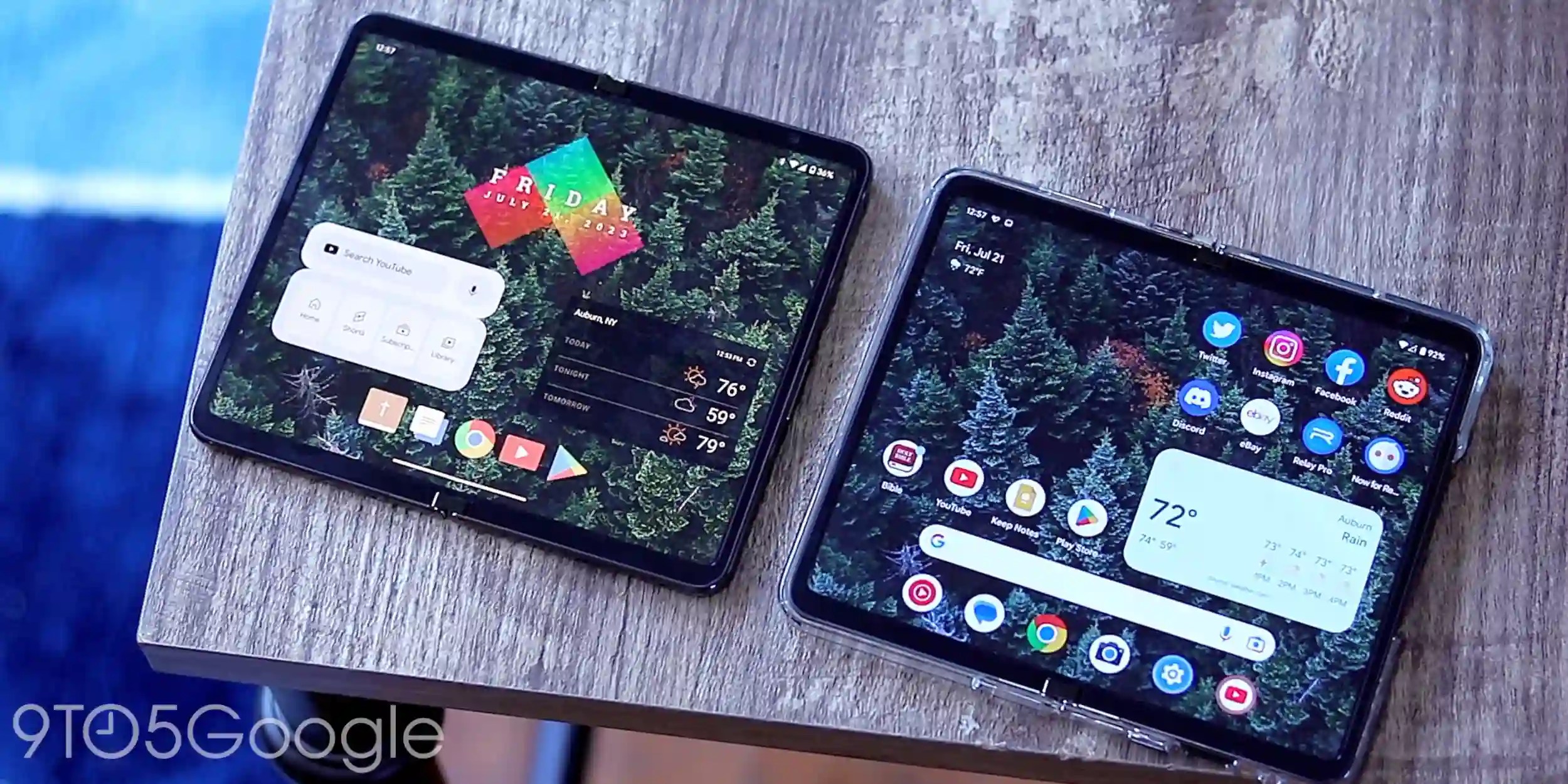
As my first full month with the Pixel Fold comes to a close, the biggest issue I’ve bumped into is homescreen customization. Being an Android enthusiast, I find the Pixel Launcher to be serviceable but restrictive in what you can and cannot do. For example, you cannot remove At a Glance or the bottom search bar. With that in mind, here are the best Pixel Fold launchers for those looking to add a bit of flair to their homescreen.
Total Launcher
Total Launcher is a highly customizable homescreen alternative that offers the most compatibility with the Pixel Fold today.
It doesn’t restrict you to the standard row/column layout that most launchers abide by. Upon the initial install, you’re greeted with a blank canvas and a handful of widgets scattered about. Edit mode, where you make most of the changes, is enabled by default. Hitting the plus button in the top right will open a menu in which you can add layouts (or grids of apps), widgets (including custom ones), and graphics, like images and icons.
Once you select a layout or widget, you can place it anywhere on the homescreen much like you would on a desktop computer. Total Launcher is a “build your own home-screen” type of launcher, and there are very few restrictions on where or how you can place these objects. With a basic level of understanding, you can assemble a great homescreen tailored to your taste.
The downside is this launcher does not have the “plug-and-play” luxury others offer. By default, you have a pretty ugly, blank canvas that requires dedicated time and inspiration of some kind to get it set up how you like.
Pros:
- Almost unlimited possibilities
- Free version is more than enough
- Easy to use once you get used to it
Cons:
- Steep learning curve
- Does not have default home screen layouts to choose from
- Can take a while to get set up correctly
Niagara Launcher
Niagara Launcher offers a stable, optimized experience on the Pixel Fold that supports both displays. You get a simple, easy-to-use launcher that requires very little setup. The design should be very popular among minimalists, given the clean layout of white text, smooth animations, and polished experience.
Niagara places everything on one singular homescreen, similar to a social media feed. A customizable widget at the top shows the time, date, weather, and battery percentage. Below that is a carousel for widgets that can be cycled through with a horizontal swipe. Underneath are your favorite, frequently used applications, while accessing the entire application drawer is done through a built-in global search or the alphabetical list on the right-hand side.
Niagara also supports icon packs, notification summaries underneath the app names, and a handful of other tweaks to customize the experience to best suit your needs.
The only thing I dislike is the cost of upgrading to a premium subscription. The pro version is a one-time $30 upcharge, which gives you access to a small selection of features that revolve around fine-tuning the experience: pop-up widgets, custom fonts, and deeper Niagara widget tweaks.
Pros:
- Beautiful design
- Many customization options
- Well-optimized for Pixel Fold
Cons:
- Pro version is expensive
- Needs more utility options
Apex Launcher
Apex Launcher is a traditional, grid-based home screen with a wide variety of personalization options.
It works decently well on the Pixel Fold’s inner and outer screens while giving you a solid foundation to work off. Opening the launcher will greet you with the default homescreen, which looks like the original Google Pixel layout from 2016. Apex also embraces the older Android 7.1 design language that’s visible whenever you open settings.
In preferences, you can customize almost every aspect of the UI, such as the app drawer, dock, scrolling animations, homescreen layout, and more. There is also the ability to apply your own custom icon packs and customize gestures to perform a specific action. These offerings make it very easy to build your custom homescreen. It took me about a half hour of adjustments to get it to look in a way I was satisfied with.
An immediate red flag, however, was the prompt to pay for a premium version. It starts at $3.99 for three months, $8.99 for a lifetime subscription, or a three-day free trial that charges you $5.99 per year afterward. Extra features granted with a premium subscription include additional app drawer customization, home screen transitions, app drawer folders, and notification badges. The most egregious benefit – one that shouldn’t even exist – is removing ads that reportedly appear when you open any web browser (I have not seen such ads in my two weeks of use). While Apex Launcher is great because of its ability to personalize, paying to remove such prevalent ads is an awful selling point.
Ultimately, Apex Launcher is a solid alternative for those that want to try something similar to the Pixel Launcher but want extra customization capability.
Pros:
- Works well with inner and outer displays
- Highly customizable
- Quick set up
Cons:
- Subscription required to remove ads
- Glitchy at times
- Minor compatibility issues
The current state of Pixel Fold customization leaves users with very few options. Looking ahead, the Nova Launcher team has said that “better foldable support is planned in a future update.” I’m looking forward to testing that out and adding other choices to the already small pool of options. In the meantime, Android enthusiasts will have to wait on developers to slowly update their launchers to support the Pixel Fold.
FTC: We use income earning auto affiliate links. More.
ncG1vNJzZmhxpKSCqLvOoKOeZpOkunB%2Bj2tqaGhnZH9ze8%2Bir56kXZu8rbCMpZiuppOdsrO%2Fjg%3D%3D